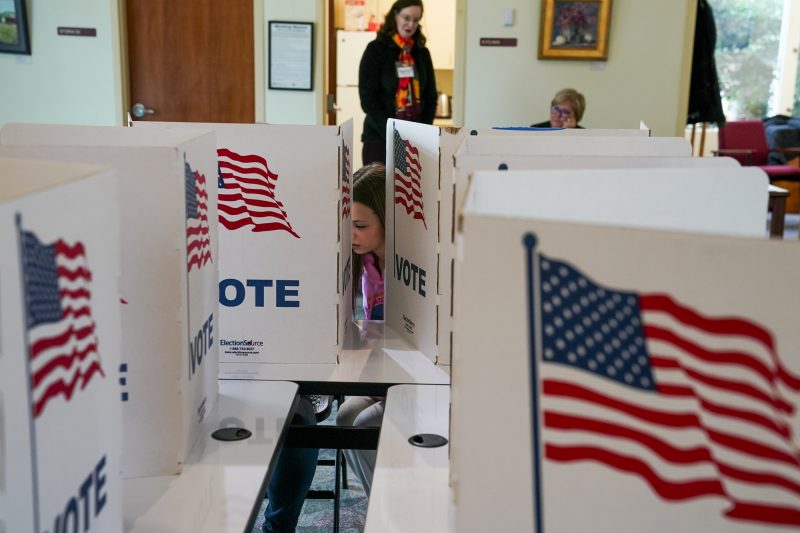Fifteen states held primaries on a somewhat-less-than-super Super Tuesday. The nominations of President Biden and former president Donald Trump have been in little doubt for some time, and the results only bolstered that.
They’re still worth mining for clues about the campaign ahead. And there were some key state primaries, as well.
Below are our takeaways as the results roll in.
The big question in the presidential race right now is what the results portend for November.
For Trump, the signals were again mixed, with some significant warning signs.
Trump became the first of the two major candidates to actually lose a state, with Nikki Haley winning Vermont. (She won the Washington, D.C., primary on Sunday.)
Trump otherwise continued his winning streak. But in addition to Vermont, Haley’s effective protest candidacy was winning at least 35 percent of the vote in Massachusetts and Virginia, 34 percent in Colorado, and taking at least 23 percent in Maine, Minnesota and North Carolina. Haley’s vote shares have fallen off from 43 percent in New Hampshire and 40 percent in her home state of South Carolina, but lots of voters are still coming out for her in a no-doubter contest. And she continues to perform better than polls suggested she would.
Maine, Minnesota and North Carolina were more telling than any other states holding Super Tuesday contests, because electoral votes are actually potentially at stake there come November.
We have some additional data in North Carolina.
Early exit polls show about 4 in 5 Haley voters declined to commit to backing the GOP nominee in November.
About 3 in 10 GOP primary voters there said Trump wouldn’t be fit to be president if he’s convicted of a crime. That’s down slightly from neighboring South Carolina, which is redder, which might suggest this sentiment is declining — but only slightly.
As notably, about 9 percent of GOP primary voters in North Carolina actually voted for Trump even as they said a conviction would render him unfit.
President Biden, who faces less prominent challengers, continued to win by larger margins than Trump. But as in Michigan last week, he ceded significant votes to such options as “uncommitted.”
That option was getting nearly 20 percent of the vote in Minnesota with about 85 percent of the vote counted, after pro-Palestinian activists sought to turn it into a protest vote again. The uncommitted share there should wind up being larger than it was in Michigan (13 percent) despite a less-robust effort — and despite Rep. Dean Phillips (D-Minn.) taking another 8 percent.
Biden’s current 70 percent overall share of the vote in Minnesota means it could be his lowest share in any state, apart from the 64 percent he took as a write-in candidate in New Hampshire.
It’s tempting to read into that. Minnesota usually features high voter turnout, which might mean that voters who were actually willing to cast protest votes were more likely to turn out and register that. Phillips also probably ate into the would-be “uncommitted” vote because of his home-state ties, meaning it might have been even higher without him. But Biden carried Minnesota by seven points in 2020, suggesting he has a cushion there.
A similar “noncommitted delegate” option was taking less of the vote in the other state that activists focused on, Colorado — around 7 percent.
“No preference” was getting 12 percent in North Carolina. But that state wasn’t targeted for protest votes. And the number seems to owe more to residual conservative Democrats; Barack Obama lost 21 percent of the vote to “no preference” in his 2012 primary.
Biden is generally taking more of the vote across Super Tuesday states than Obama did in 2012.
But Biden did manage to lose a contest Tuesday — in American Samoa, where a political unknown named Jason Palmer won the territory’s caucuses. (The territory voted for Mike Bloomberg in the 2020 primaries, with Biden taking just 9 percent.)
Republicans in the Trump era have nominated extreme statewide candidates that appeared to cost them winnable races. That was particularly the case in the 2022 midterms.
And it continued on Tuesday — in a big way.
In what may be the nation’s marquee governor’s race, the GOP overwhelmingly nominated Lt. Gov. Mark Robinson. Robinson’s past statements make some of these flawed candidates look like mainstream Republicans. He has:
attacked school shooting victims and questioned whether the Las Vegas massacre was real.suggested 9/11 might have been an inside job and that the moon landing might have been faked.repeatedly employed antisemitic tropes.suggested Black Americans should pay reparations rather than receive them.repeatedly derided women in offensive terms — and much, much more.
He’s the kind of candidate the party has at times made pains to avoid nominating; there were some efforts by the establishment wing of the party to defeat other extreme Republicans in some House primaries held Tuesday.
But there was little in the way of such an effort with Robinson; Trump has praised Robinson, after all, and it looked to be for naught.
Now the GOP finds out whether it will learn its lesson about such candidates the hard way — again.
Despite all the states voting, there were relatively few key Senate primaries. But a couple are worth noting.
The big result was Rep. Adam Schiff (D) emerging as the strong favorite to be California’s next senator. And he’ll avoid a potentially problematic faceoff with a fellow Democrat in the state’s top-two system, after Republican former Major League Baseball star Steve Garvey finished second over Rep. Katie Porter (D-Calif.). Schiff and Garvey were declared the top two very early in the night, suggesting Porter wasn’t that close.
The other significant result was Democrats getting their preferred candidate to face Sen. Ted Cruz (R-Tex.): Rep. Colin Allred (D-Tex.).
Democrats haven’t won statewide in Texas in decades, and the odds are still against them even as the state has become somewhat more competitive. But on a Senate map where they have precious few pickup opportunities, Allred gives them one of their best — next to Florida.
Cruz won his 2018 race by just three points, and some polling suggests this race could be competitive.
Other early notable results included some establishment-oriented and more-moderate incumbent Republicans struggling — a trend that pops up from time to time.
Rep. Steve Womack (R-Ark.), who decried the party’s hard-right flank for its efforts to replace then-Speaker Kevin McCarthy (R-Calif.), was winning his primary just 54 percent to 46 percent.
Rep. Dan Crenshaw (R-Tex.), who has also criticized some of the excesses of his party’s right flank, was taking less than 60 percent.
And Rep. Tony Gonzales (R-Tex.), who was censured by his state Republican Party after voting for bipartisan gun restrictions after the tragedy in Uvalde, Tex., was at 46 percent and headed for a runoff. (His nearest opponent was at 22 percent.)
The results underscored that the expedient call in the GOP is aligning with the right wing and toeing Trump’s line. Incumbents don’t often lose primaries, and these ones probably won’t. But failing to do these things can put your career at risk.



























